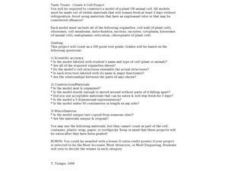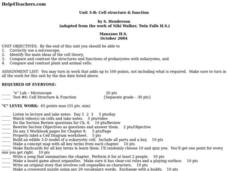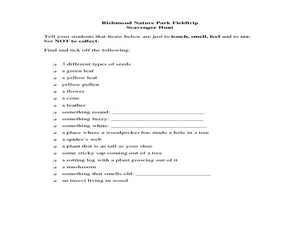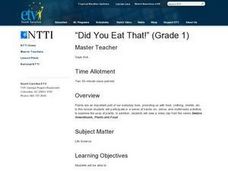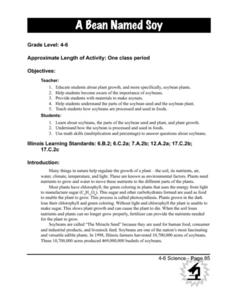Curated OER
Yummy for my tummy!
First graders read the story Tops and Bottoms and identify vegetables that are eaten from the stem, root, and leaf of a plant. In this vegetables lesson plan, 1st graders learn vocabulary about different vegetable parts and write journal...
Curated OER
Let's Sort a Salad
Young scholars examine edible plants by identifying salad ingredients. In this botany lesson, students discuss the different vegetables that can be eaten in a salad and draw them on a worksheet. Young scholars review vegetable vocabulary...
Curated OER
From McGee's Farm to the Movies
Learners participate in several plant-themed activities. They keep a food log, identify any plants they have eaten and then classify these foods by the part of the plant that is edible. Students sing songs about plants, make collages,...
Curated OER
Tasty Treats
For this biology worksheet, students construct a model of a plant or animal cell using edible materials that will remain fresh at least three days. They identify and label each part to include various organelles as listed. Students also...
Curated OER
Cell Structure and Function
Students identify the main ideas of different cell theories. Using a microscope, they compare and contrast the structures and functions of prokaryotes and eukaryotes. They also compare and contrast animal and plant cells and complete...
Curated OER
Richmond Nature Park Field Trip
Students identify different plants and their uses by attending a field trip. In this Canadian plant lesson, students explore the great outdoors of Vancouver, B.C. and discuss the uses of plants by the Native Americans that once resided...
Curated OER
"Did You Eat That!"
First graders investigate why plants are an important part of our everyday lives, providing us with food, clothing, shelter, etc. In this lesson students participate in a series of hands-on, online, and multimedia activities to examine...
Curated OER
Plants
First graders learn the basic needs of plants, label the major parts of a plant and name their uses. They also use a KWL chart.
Curated OER
Rosa Parks Community Garden
Ninth graders investigate how we depend on plants as the original source of most food. They investigate the parts of plants, and which parts are edible. Students are explained that the garden is also a classroom and the same rules apply.
Curated OER
Lets Think About...Plants
Students bring in various vegetables and make friendship soup. They plant seeds and discuss the things plants need to grow and thrive.
Curated OER
Eat Your Vegetables Crossword Puzzle
In this crossword puzzle worksheet, students read the statements about vegetables and find 8 words to complete the crossword puzzle.
Curated OER
Whitewater Canal State Historic Site
If you happen to live in Indiana, or a neighboring state, and are planning a field trip to the Whitewater Canal State Historic Site, then this lesson plan will suit your needs quite well. In it, suggestions for activities before, during,...
Curated OER
Eight Ways to Celebrate Fruit
Activities designed to incorporate the study of fruit into your classroom during National Fruit and Vegetable Month.
Calvin Crest Outdoor School
Survival
Equip young campers with important survival knowledge with a set of engaging lessons. Teammates work together to complete three outdoor activities, which include building a shelter, starting a campfire, and finding directions in the...
Curated OER
The Living Environment
For this living environment worksheet, students complete a crossword puzzle given 34 clues about the various species in the environment that produce, consume and decompose. Topics also include photosynthesis, respiration, glucose,...
Houghton Mifflin Harcourt
Three Skeleton Key
Encourage your students to interact with the text as they read. While reading "Three Skeleton Key," class members note predictions, define words and study their meanings, take notes on how the suspense builds, and jot down ideas about...
Horticultural Society of New York
Dress Up Your Salad
Salad dressings use a variety of different ingredients, but it's important to have a healthy balance of greens to create a delicious mix. Young chefs examine five types of herbs including chives, basil, dill, parsley, and thyme to make a...
Cornell University
Study Soil
What's in soil? Young scientists study the pH levels of soil from their school yard. They observe the land and area the soil came from to decide if location has anything to do with acidity level.
Curated OER
The Seed Match
Young scholars study seeds and plants. In this science instructional activity, students explore seeds from various types of plants and complete a worksheet about seeds. Young scholars discuss plants that are fruits and vegetables and...
Curated OER
Genetic Engineering
Young scholars are introduced to the concept of genetic engineering. In groups, they participate in a variety of experiments, in which they analyze the effect of chemicals on different substances. Using the internet, they research...
Curated OER
Soybeans: The Miracle Seed
Learners discover why soybeans are called the "miracle seeds." They make their own soynuts and share other foods made from soybeans. They create a bulletin board of soybean products.
Curated OER
Making Healthy Eating Choices for You and Others
Students use the USDA food guide pyramid to choose items for a balanced diet. In this food pyramid instructional activity, students play a game naming the items and their foo groups. Students participate in cross curricular activities...
Curated OER
Fruit or Vegetable?
Watermelon is a vegetable? A tomato is a fruit? Believe it or not, this debate is decades old. Groups examine rulings by the US Supreme Court, the USDA, and state statutes before developing their own criteria to use when labeling the...
Curated OER
Healthy Foods
Students view a video which explores the following statement. "You are what you eat." They discuss the food industry, organic foods, and healthy food choices. They chart what they eat on a daily basis and make plans for healthier options.





